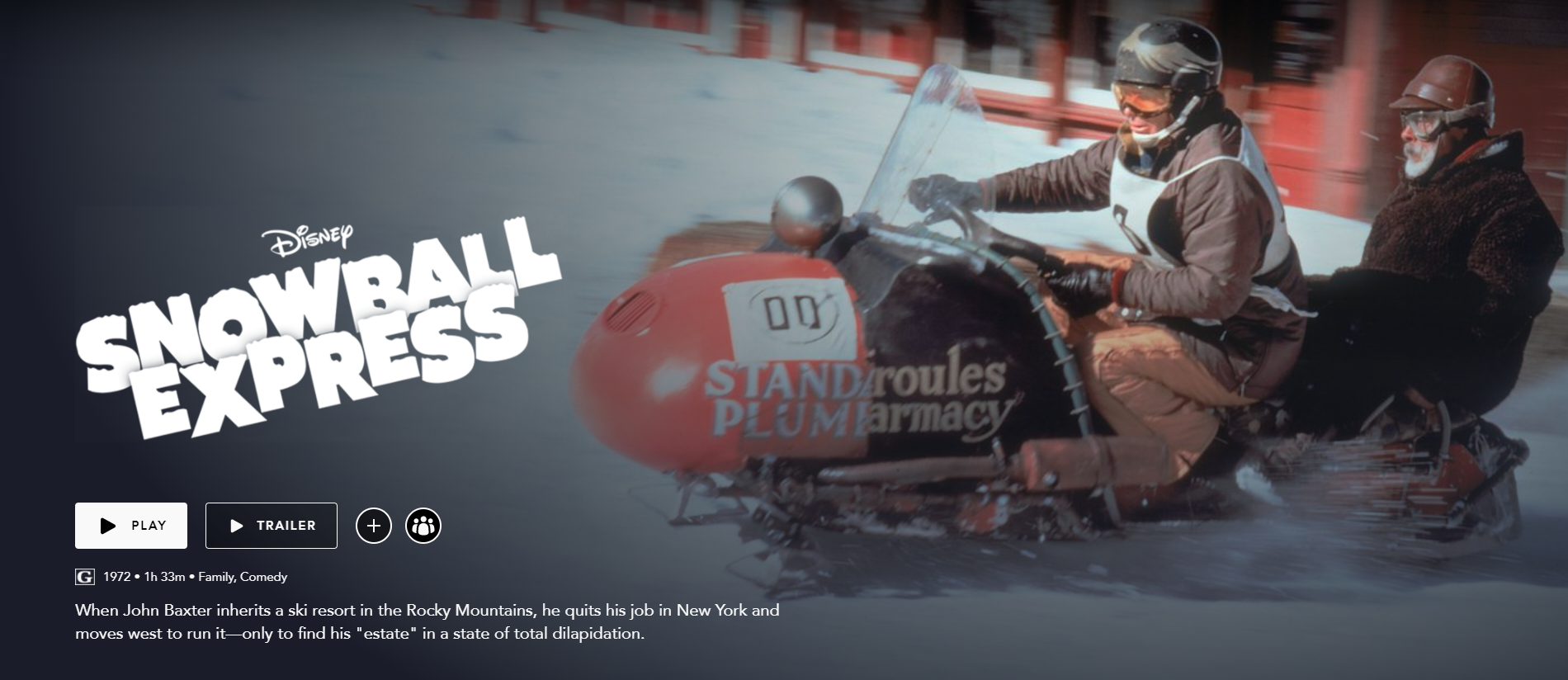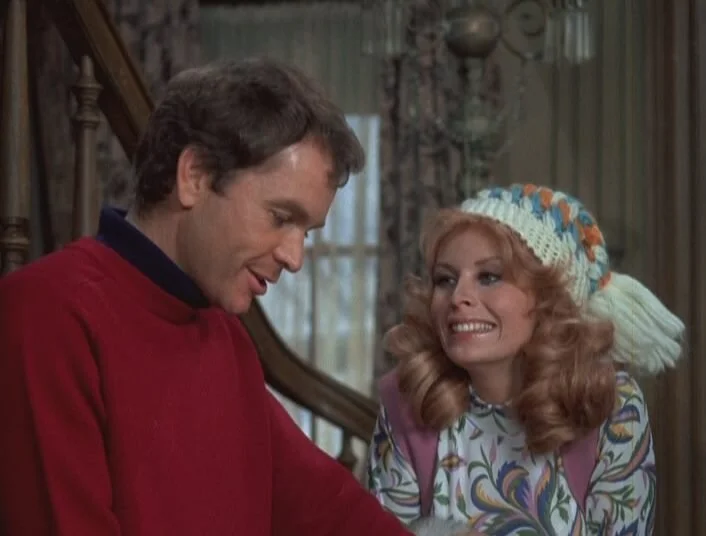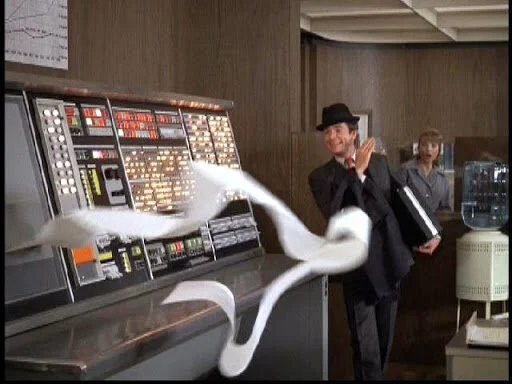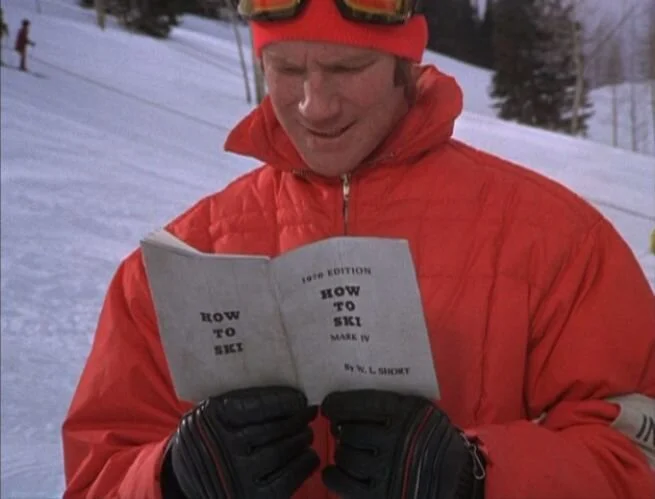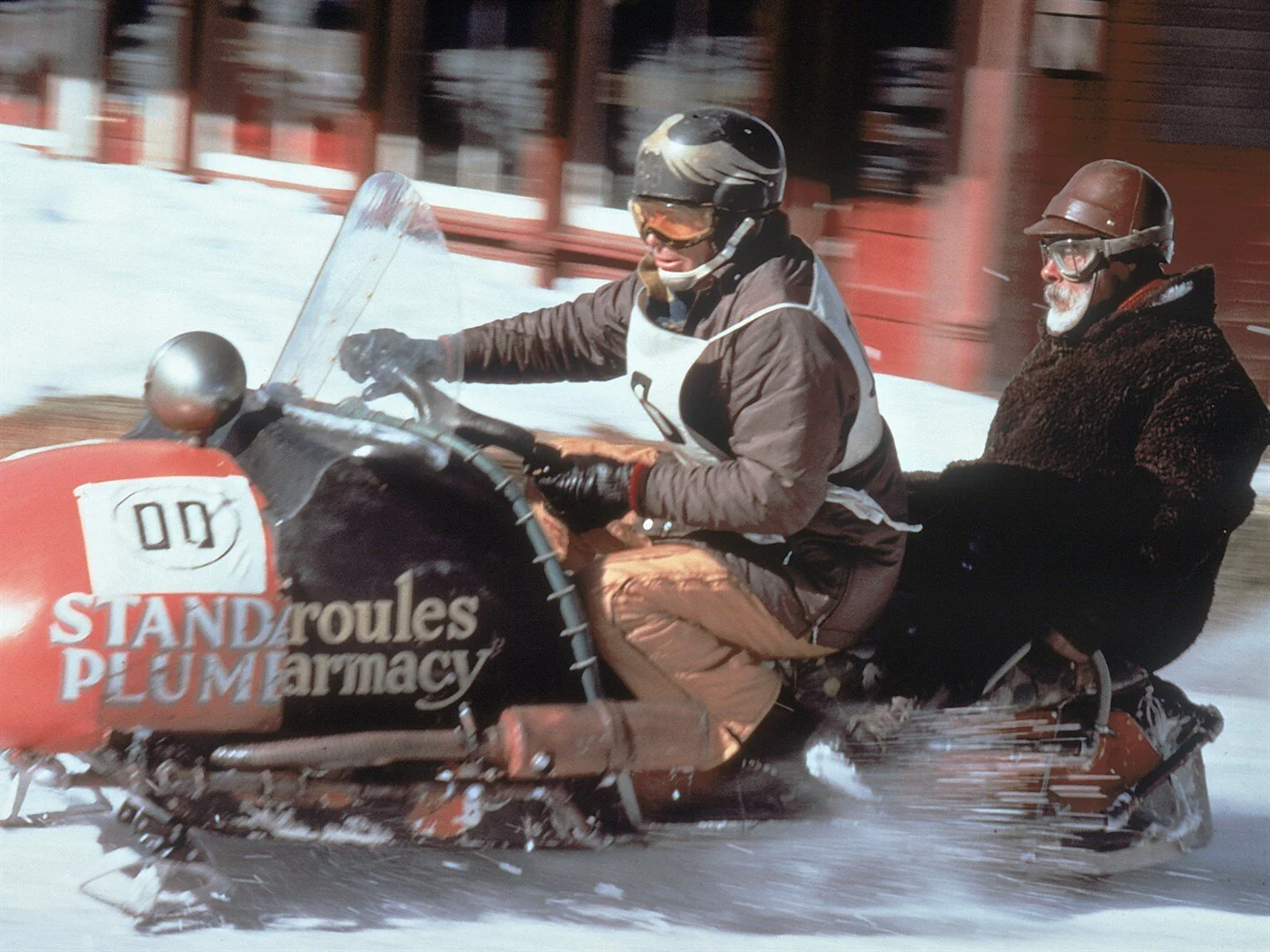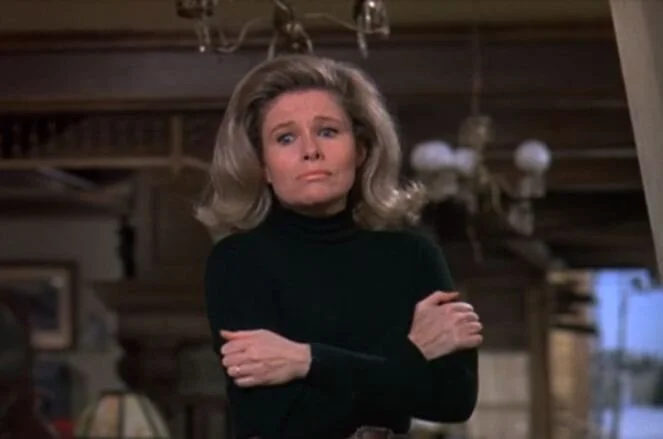Review: Snowball Express (DMC #51)
Cozy up and get ready for a wintry flick! Last night we watched Snowball Express, the fifty-first film in the Disnerd Movie Challenge! If you’ve seen it recently, feel free to skip ahead to our review. If you need a refresher, our synopsis is below.
Synopsis
Johnny Baxter arrives late to work in New York City to find a lawyer, Mr. Fowler, waiting for him. Mr. Fowler informs Johnny that he has inherited his uncle Jake’s Grand Imperial Hotel—and the hotel appears to be a profitable enterprise with $14,000/month income. Johnny immediately quits his job in grand fashion, awarding his office supplies to his coworkers, and causing the computer to malfunction on his way out. His family, however, is far less enthused when he announces that he’s quit his job and decided to move the whole family and the dog to Silver Hills, Colorado, to run the inherited hotel. Though the entire family protests, they eventually all drive from New York to Colorado to see this hotel. When they arrive, however, they find “Crazy Jake’s” Grand Imperial Hotel far on the outskirts of town, completely in shambles—everything is covered in cobwebs, there are bats and racoons living in the hotel, there’s no electricity, and there are fish in the plumbing. Their first night in the drafty hotel, they discover that an old man named Jesse McCord has been hiding out on the property. Johnny ultimately agrees to hire Jesse as a bellhop so he can keep on living at the hotel. Short on funds after paying the lawyer’s legal fees and paying for the repairs to the computer he destroyed at his former workplace, Johnny decides to get a bank loan to fix up the place. He visits the local bank where the bank owner, Martin Ridgeway, offers to buy the hotel from Johnny so he can turn it into a home for wayward boys. Johnny declines and leaves emptyhanded. After Johnny leaves, however, Mr. Ridgeway’s assistant, Miss Wigginton, calls out her boss on his lie—she knows he has no intention of building a home for boys. He wants the land.
Back at the hotel, a local, Wally Perkins, rides up on his snowmobile and reveals to Johnny and his wife, Sue, that their land is far more than just the hotel. Inspired, Johnny decides to turn the hotel into a ski resort. He calls up another bank outside of town and speaks to Mr. Wainwright about a loan. Mr. Wainwright offers to discuss it while skiing at a nearby resort. Johnny agrees, but he doesn’t know how to ski, and when Mr. Wainwright leads him to ski “nightmare alley,” Johnny feigns a knee injury to get out of it. It works, briefly, until Johnny clumsily knocks over a rack of skis and goes flying down the slopes. By the end of his awful run, he’s caused more accidents at that resort than the last major avalanche, and he still doesn’t have a loan. Mr. Ridgeway visits Johnny at the hotel and offers him a $3,000 loan, which Johnny gladly signs without hesitation, even though Sue warns she doesn’t trust Mr. Ridgeway. As Johnny starts dreaming of all the things he could do to improve the hotel with the new loan, the boiler Jesse and Wally were trying to fix explodes, causing loads of damage to the kitchen—Johnny won’t have the funds to even buy a rope tow after all the repairs are done. However, there is a steam-powered donkey engine in town that’s usually used for logging but hasn’t been used. Johnny just has to find a way to get it up the mountain to use it as a rope tow. No one in town will help him, however, because they’re all afraid of Mr. Ridgeway. Johnny’s son, Richard, suggests letting the engine tow itself up the mountain—and it works! They have a rope tow! When the hotel’s opening day arrives, no one shows up. The Baxters are about to give up when Wally, out on his snowmobile, hears the train whistling repeatedly. He drives over to see what happened and discovers the train is stuck in an avalanche and can’t get through to the neighboring town’s ski resort. Johnny gets an idea—they should bring all the skiers from that train to the Grand Imperial Hotel. The hotel is quickly overrun with guests, and while there are some hiccups in learning how best to serve their guests, the Baxters end the day with a hotel full of happy customers. The next day, however, when Wally is out attempting to teach a group of skiers when he doesn’t even know how to ski, Wally nearly skis off a cliff and gets stuck on a tree. When Johnny arrives on the scene, Richard quickly ties him to the rope tow so he can rescue Wally, but while the rescue is taking place, no one notices that one of the ropes anchoring the donkey engine has caught on fire. Just as Wally is pulled off the cliff, the donkey engine snaps free and starts flying down the slopes with Johnny and Wally trailing behind. The engine plows through the hotel, breaking the walls, before finally coming to a stop. The guests are all forced to find other accommodations.
Johnny returns to Mr. Ridgeway to ask for an extension on the loan, but Mr. Ridgeway refuses. He again offers to buy the hotel from Johnny, but Johnny isn’t ready to give it up just yet. Miss Wigginton signals to Johnny, drawing his attention to the window display advertising the prize money for first, second, or third place in the upcoming snowmobile competition. Johnny decides to enter. Wally can’t drive his snowmobile in the race due to his broken arm after the ski accident, but he offers his snowmobile to Johnny, who recruits Jesse to be his second rider. Sue tells Johnny if he enters the race she’ll leave him, but Johnny goes through with it anyway. On race day, Johnny’s family is nowhere to be seen. He races against Mr. Ridgeway and comes close to winning, but at the very end, the damaged snowmobile goes off out of control and Johnny ends up being towed across the finish line late at night by a horse, but Sue greets him at the finish—she didn’t leave after all. The next day, the loan is due, so Johnny decides to sign over the hotel to Mr. Ridgeway, but as they’re going over the paperwork, Miss Wigginton reveals that Mr. Ridgeway really wants the land because of all the timberland included with the property. As they discuss how the timberland reverted back to the owner of the Grand Imperial Hotel, Richard asks why the same rule wouldn’t apply to the town—wouldn’t the town revert back to the hotel owner since the town didn’t have the library or hospitals that were part of that agreement? Miss Wigginton says Richard is right—Johnny may just own all of Silver Hills—including the bank! Mr. Ridgeway quickly changes his tune. The loan is forgiven and Johnny keeps the hotel. The whole Baxter family celebrates by going skiing.
Thoughts Before Watching
Megan: I’ve never seen this one before, so I’m not really sure what to expect, but from the description on Disney Plus it sounds like this might be a fun winter comedy to kick off the holiday season.
Kevin: All right, I have a confession to make here. Since we began this challenge and this blog, I have been unenthusiastic every time we’re about to watch another live-action film. I get far more excited about animation, and I’m looking forward to when we hit the ‘90s. I know I’m being biased, because my earliest memories come from that decade, and I prefer animation in general. With a few notable exceptions there aren’t many pre-’80s/’90s live-action movies that I genuinely like. There are several reasons, but which I’ll avoid discussing in this section for the sake of brevity. So, even after reading the description for Snowball Express on Disney Plus, I am just not interested. However, in my defense, a huge part of this lack of interest is after the appalling disappointment with our last Dean Jones movie, Million Dollar Duck. Let’s dive on in anyway, and see if this one is better!
Thoughts After Watching
Dean Jones…again…
Megan: Wow…Disney must have had quite the contract with Dean Jones for him to star in yet another live action Disney film. I don’t know about everyone else, but after seeing him in so many films back to back it gets a little less entertaining. He’s pretty much the same guy in every movie—his circumstances might be different, but the personality he brings to the role stays the same. It’s almost like he’s starring as himself. While he can bring some fun comedic moments to these various films, I’m looking forward to the era when studios weren’t allowed to sign such long-term contracts with actors—we need some fresh faces (and some fresh acting talent) on screen.
Kevin: I’m a bit mixed here at this point; I’ve enjoyed his performances in all his films, and in spite of how much I hated Million Dollar Duck, Dean Jones was great at nailing comedy. To what Megan said about him being “the same guy,” I agree with this, and I think it’s a product of his films’ genres. In Jones’ slight defense, he plays the same character much in the same way I said Hayley Mills played the same type of character in all of her roles. The difference, however, is that Mills’ films were not all strictly comedy. Films like The Parent Trap, Pollyanna, and The Moon-Spinners had comedic elements while also tackling some serious real-world topics. This allowed Mills’ peppy characters to react to a range of circumstances. Jones’ films, on the other hand, are all comedies and so far all utilize some rather extreme and even supernatural ideas which make the stories far less grounded in reality. This isn’t in itself a bad idea, but it’s getting repetitive. I wouldn’t mind seeing further films with Dean Jones, but some variety in the genre would be nice.
Johnny Baxter is the epitome of sexism
Megan: What makes Dean Jones particularly unlikeable in this film compared to the others is just how sexist Johnny Baxter is. What’s more, he’s constantly choosing infidelity. Here is a married man who on several occasions thinks it is perfectly acceptable to make (I presume unwanted) advances toward or willingly accept advances from other women. For example, when the film opens and Johnny decides to quit his job, he goes around the office thanking everyone for their contributions to the office culture. The men he singles out are lauded for logging hours at the water cooler or cutting off another man’s tie—things no employee would ever be applauded for. The men are at least recognized for things they did, though. The lone woman he singles out, Beverly Bockser, isn’t lauded for anything she did, but rather how she looks:
JOHNNY BAXTER: Beverly Bockser! Bev-er-ly Bockser. The Outstanding Achievement Award, my staple remover, goes to that person who has demonstrated that she can contribute the most to office morale. Miss Bockser, I think I can say without fear of contradiction that you have the greatest legs in this office, if not on the whole 40th floor! They have been a distraction. They have caused man-hours wasted, but they’ve made life here bearable.
Here is a working woman whose sole value in the eyes of her male coworkers (and the male writers behind this film) is reduced to how sexy her legs are. What’s worse is Beverly then kisses Johnny on the cheek! Granted, I read that kiss as more of a “if I kiss him maybe he’ll shut up and I can get out of this uncomfortable situation” kind of kiss, rather than an “oh thank you so much for calling me an attractive distraction to the men in this office” kiss, but still, it completely sends the wrong message. Having her kiss Johnny not only encourages this objectifying office culture within the world of the film, it also sends a message to audiences that it is totally acceptable and desirable for men to objectify women—in a professional setting, no less! Was this how office culture was in the ‘70s when this film was created? In some cases, unfortunately yes. Does that make it okay? Absolutely not.
Throughout the film, Johnny seems unconcerned with infidelity. There’s his coworker, Beverly, but then there are several other moments throughout the film where he either flirts with another woman, or does nothing to resist the advances of another woman. When he’s flying wildly down the ski slopes, he grabs hold of a woman, saying “Oh, ma’am, I’m very sorry. I just couldn’t help myself.” First of all, that line plays into the ridiculous stereotype that men’s unwanted advances should be forgiven because they “just can’t help themselves.” This gives men an “out” so they don’t have to take responsibility for their actions, when in actuality, men are just as capable as women in controlling their desires (and if they can’t, those men should seek professional help, not blame women for their problems). What’s worse is how this exchange on the ski slope continues. The woman replies to being grabbed around her chest with “Aren’t you a tease. Why did you pick me with so many other pretty girls on the slope?” I can’t speak for all women, but to me this reads as an entirely unrealistic response to being grabbed by a strange man. Sure, in this context, Johnny was flying down the ski slope out of control because he didn’t know how to ski, and the woman he grabs is just one of many people he encounters while trying to stop his momentum. However, the creative choice to have Johnny grab a woman in such a way, and have the characters exchange those lines, betrays the sexist male gaze at work behind the scenes. I’m fairly certain a team of women would have written that scene much differently.
Megan: Naomi Voight does turn the tables a little bit, but it doesn’t make Johnny look any better. Though he seems mildly uncomfortable with her very forward advances toward him, he does nothing to dissuade her. He lets her cuddle close to him on the sleigh ride to the hotel. When she flirts with him at the reception desk, suggesting he give her private ski lessons, Johnny flirts back—until he hears his wife shatter something in the kitchen and he immediately takes on a more business-like tone. Sue Baxter doesn’t help matters much, either. When Naomi asks if Sue Baxter is related to Johnny, asking if she’s “his older sister or something,” Sue avoids specifics by replying “or something.” Later, Sue calls out Johnny by saying “Naomi-tight-pants” might stay until spring because she has a thing for Johnny, to which Johnny replies that he’s just being a good host. It would seem that Johnny’s first priority is keeping Naomi happy so he can profit from her stay at his hotel. Sue seems to begrudgingly accept that Naomi is a paying customer and, as such, should be kept happy, but Sue clearly doesn’t like Johnny encouraging Naomi’s advances. Yet even after Sue expresses this to Johnny, he carries on and makes no effort to tell Naomi that he is in fact married.
Johnny is really bad at planning
Kevin: From the moment we are introduced to Johnny, we see that he makes very rash decisions. I wouldn’t go so far as to call it avarice, but his greed gets the better of him on multiple occasions. His first big mistake is to immediately quit his job upon learning that he’s inherited a supposedly lucrative hotel. Now, Johnny’s reaction is not entirely without merit; he clearly despises his job and his boss, Mr. Carruthers, doesn’t help matters (honestly, any boss that would be upset at any employee, especially one who has worked at the company for 11 years, for being a few minutes late to the start of their schedule immediately goes on my imaginary list of crappy bosses). It’s clear that Johnny feels overworked, underpaid, and is in some financial trouble, based on his initial misunderstanding about an unpaid bill when talking to the lawyer, Mr. Fowler. I imagine many of us have been in dead-end, soul-sucking jobs before, and so can certainly relate to Johnny’s wanting to get out. However, the way he goes about quitting his job is over the top and potentially damaging to his prospects. For one, Johnny lets loose a series of ramblings to and about certain co-workers, including the remarks to Beverly Bockser which Megan mentioned before. He also causes a bit of technical mayhem using his computer cards. On the one hand, Johnny’s actions seem to reflect the overall atmosphere of his workplace, as many of his now former co-workers applaud him for such a dramatic exit. Still, in a real-life situation, quitting a job this immediately and with this kind of behavior would not go over this well. The second issue with this mistake is that not once did Johnny bother to verify any of the information Mr. Fowler gave him. A rational decision would have been for Johnny to fly out to Colorado during a weekend to check out the Grand Imperial Hotel and determine if it was truly a worthwhile investment. Perhaps Johnny couldn’t afford a quick flight out? I sincerely doubt that, though. Instead of being cautiously optimistic, Johnny makes the rash decision to quit work and uproot his entire family. And because this is the ‘70s, the movie has to include the sexist trope that Johnny, as the man of the house, gets to make this huge life-changing decision without talking about it with his wife, Sue. I don’t blame Sue or their children for being annoyed with him once they discover the hotel to be in shambles. They gave up their lives for this?! I’m not saying that Johnny should have stayed with a job he hated, but his rash, quick acceptance of his inheritance without checking if it was legitimate is completely irrational.
Kevin: The next financial blunder Johnny makes is in transforming the hotel into a ski lodge. His methods to make this dream a reality are ridiculous—hilarious, but ridiculous nonetheless! Johnny is convinced he wouldn’t be given a bank loan because he knows nothing about skiing. Unless the requirements for bank loans worked a little differently 50 years ago, Johnny’s real problem in my opinion isn’t a lack of knowledge of skiing, but a lack of business sense. To his credit, he is savvy enough to recognize that if he can tap into the skiing industry he can revitalize the hotel and bring in business. But that’s where his business sense really seems to stop. Johnny is strapped for cash to make his plans work, but his shortcuts for turning the hotel into a fledging business come off more as poor decision-making than making the best of a bad situation. For example, he hires Wally to be his ski instructor… despite Wally not knowing anything about skiing! Poor Wally even has to consult a how-to-ski book before he gives lessons! Johnny’s justification for this is all about saving money, even though he has more than enough to hire proper instructors. Heck, the movie establishes that there are some great skiers who come out to the slopes for fun; I’ll bet if Johnny were willing to fork over some cash, he could have hired one of those people! Johnny may want a lucrative business, but he’s forgetting one very crucial rule of investing: you have to spend money to make money.
Kevin: The last big financial mistake is when Johnny decides to participate in a snowmobile race against the banker, Mr. Ridgeway, even though Johnny has never ridden a snowmobile in his life. He makes it seem as if it’s an easy thing to do, and he does it so he can win enough prize money to keep the business going. Again, the smarter thing to do would have been to find someone with enough snowmobile experience to participate on his behalf. Although Johnny and Jesse do come close enough to winning, I bet they would have done much better with an experienced racer.
Johnny’s desire for money borders on fanaticism. It becomes so bad that it strains his relationships with his family. It’s important to note that all of these decisions are heavily criticized by Sue to the point she considers leaving him and the hotel behind. I wonder how much better the hotel would have fared had Sue been in charge of all the finances from the get go. In the end, Johnny’s poor financial decisions have no consequences. Not only does his family stick with him, but a completely out of left field legal technicality is suddenly thrust upon the characters and the audience toward the end, which declares that Johnny actually owns the entirety of Silver Hill. I know this is a comedy and things have to end well, but I would have liked to see Johnny experience some real consequences for his decisions.
Sucks to be married to Johnny Baxter
Megan: As noted above, Sue’s marriage to Johnny can’t be easy with his penchant for flirting with other women. Beyond that, however, Johnny seems to have little regard for his wife or her needs. Johnny is the sole breadwinner in his family, which means the whole family relies on his income, so when he decides to quit his job without warning, Sue is rightfully angry with him. I think anyone would hate to have their spouse decide—without input from anyone else—to quit their job, uproot the entire family, and move across the country to run a hotel with no plan, no experience, and no idea what state the hotel will be in upon arrival. When they finally arrive at the hotel and Sue again gets angry with Johnny for getting the family into this mess, his patronizing response is “you’re beautiful when you’re angry.” Personally, I hate this response to female anger. We see it a lot in media. A woman is expressing her (usually justified) anger at a man and the man’s response is to belittle her anger by calling her cute, adorable, pretty, or beautiful. The right thing to do would be to acknowledge and validate the woman’s anger, and, if the man is the cause of it, apologize. Instead, we see a man trying to placate a woman with what he thinks she wants to hear—telling her she’s attractive. PSA for all the men out there, most women don’t want to be told they’re beautiful in that context—they want to be heard. Johnny repeatedly fails to listen to Sue throughout the film. He doesn’t listen to her when she’s angry; he doesn’t listen when she expresses her displeasure over Naomi; he doesn’t listen when she warns him about the banker, Mr. Ridgeway; and he doesn’t listen when she tells him she’ll leave him if he decides to go through with the snow mobile race. Sure, it would seem that last one was a bit of an empty threat on Sue’s part since it turns out she didn’t leave, but even if she had followed through, it doesn’t seem like it would have made much difference to Johnny. He would have kept on doing what he wanted regardless of what it might mean for his wife and children.
No Bechdel wins here
Megan: This film may have several named female characters with speaking roles, but no two of them ever speak directly to each other. The closest we get is when Sue tells her daughter, Chris, that they’d better go unpack the car before it gets dark, but Chris doesn’t reply to her, so I don’t feel it fully counts as a pass according to the Bechdel test. It’s unfortunate, too, considering that Mr. Ridgeway’s assistant, Miss Wigginton, is the unofficial hero of this film. If it wasn’t for her hint, Johnny wouldn’t have entered the snowmobile contest. Johnny fails the contest, but that doesn’t matter, because Miss Wigginton again comes to the Baxters’ aid when she reveals that Mr. Ridgeway has no intention of turning the hotel into a home for boys—he wants the property so he has access to the timber land. Miss Wigginton goes a step further, revealing that the Baxters may just own the entire town because of how the deeds were originally written. However, in every instance Miss Wigginton speaks directly to Johnny—she never speaks directly to Sue or Chris or any other woman, so there’s no chance for a Bechdel test win. It’s just as well. With all the sexist remarks throughout the film, it would feel pretty weird if it also passed the Bechdel test.
Fun for casual viewing, but no strong re-watch value
Megan: Don’t get me wrong, there’s a lot of fun humor in this film despite its issues. The antics of the Baxter family as they discover everything wrong with the hotel—including fish in their water!—have some great humor, as do Johnny’s skiing escapades. The cowardly dog, ironically named Stoutheart, also adds some fun to the mix. Overall, however, the plot was a bit predictable, and the characters could have been better developed. If I was channel surfing and came across this, I might watch it again, but it’s not something I’ll be seeking out for a second viewing any time soon. Also, there’s still one element of this film that was never resolved—why in the world is this film called Snowball Express? That’s not the name of the hotel, or the snowmobile, or seemingly anything else within the film, so it feels like a bit of a misnomer.
Kevin: We’ve been a bit hard on this movie, but there are definitely good moments. I enjoyed everything to do with Johnny’s financial mishaps, which made up most of the comedy. The straight up goofiness on the slopes brings out plenty of chuckles, and the Baxter family’s attempt to spruce up the disaster that is the Grand Imperial Hotel adds a bit of hilarity. These elements really work, it’s just that we’ve already seen this type of movie plenty of times before. As I said in the beginning, I usually don’t get excited about older movies anyway. Even many of the live-action films from earlier on in our challenge which I ranked high are not good enough that I really plan to go back and watch. This film falls in that same category.
Verdict
Kevin: 5
Megan: 5
Final Score: 5
What did you think of Snowball Express? Leave your comments below!
Ways to Watch
DVD
